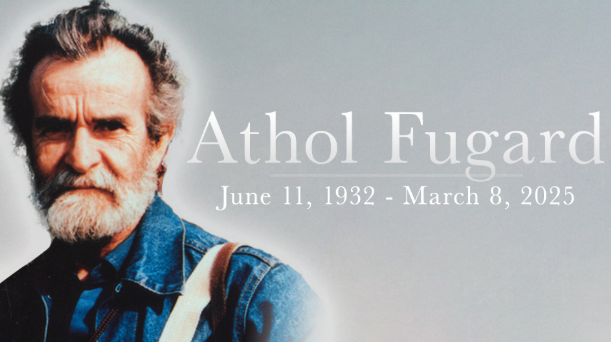
Athol Fugard is a South African playwright, novelist, actor, and director. He is known for plays that address apartheid, social injustice, and human struggle. His works are stark, emotional, and morally compelling. Fugard is considered one of the most important figures in South African theatre.
Early Life
Athol Fugard was born in 1932 in Middelburg, Eastern Cape, South Africa. He grew up in a family of teachers and civil servants. From an early age, he was exposed to literature and the arts. He later studied teaching and drama, which shaped his theatrical career.
His experiences in apartheid South Africa deeply influenced his writing.
Theatrical Beginnings
Fugard began writing plays in the late 1950s. He focused on stories of ordinary people facing social, racial, and moral challenges. His early works were performed in small theatres and community halls. He co-founded the Serpent Players, a theatre group dedicated to socially conscious plays.
Major Works
-
No-Good Friday (1958) – Early play exploring South African life.
-
The Blood Knot (1961) – Examines race relations and family bonds.
-
Boesman and Lena (1969) – Story of displacement and survival under apartheid.
-
Master Harold… and the Boys (1982) – Critically acclaimed; explores racism and friendship.
-
A Lesson from Aloes (1978) – Political allegory about apartheid.
-
My Children! My Africa! (1989) – Focuses on education and political awakening.
The Blood Knot (1961)
One of Fugard’s earliest major works. It explores the complex relationship between two brothers of different skin tones. The play highlights apartheid’s psychological and social effects.
Boesman and Lena (1969)
Fugard examines displacement and survival under apartheid. The play is minimalistic but emotionally powerful. It portrays the struggle for dignity in oppressive society.
Master Harold… and the Boys (1982)
His most famous play. Set in a tea shop in apartheid South Africa. Explores racism, power, and human relationships. Performed internationally and widely studied.
What Makes Him Different
-
Writes with honest, unflinching social commentary.
-
Combines political critique with human emotion.
-
Uses minimalistic stage settings to focus on characters.
-
Explores apartheid’s psychological and social impact.
-
Internationally acclaimed; work is performed worldwide.
Fugard’s theatre is emotional, moral, and socially conscious.
Who Reads and Watches Him
-
Students and academics of theatre and African literature.
-
Audiences interested in apartheid, social justice, and human struggle.
-
Theatre-goers looking for powerful, emotional performances.
-
Global audiences exploring postcolonial and moral issues.
His plays resonate with both South African and international audiences.
Collaborations and Influence
Fugard worked with:
-
John Kani – Actor and co-creator in several plays.
-
Winston Ntshona – Co-actor in Sizwe Banzi is Dead and other works.
-
Local and international theatre groups – To stage South African stories globally.
He mentored actors and playwrights, influencing generations of theatre artists.
Activism and Cultural Role
Fugard used theatre as a tool for political and social activism. His plays challenged apartheid and exposed racial injustice. He spoke publicly about human rights, inequality, and cultural identity. Through art, he gave voice to marginalized South Africans.
Later Years and Legacy
Athol Fugard continues to write, direct, and contribute to theatre. He has received numerous awards for literature and drama, including international recognition. His work is studied in universities worldwide. He is considered a pioneer of politically conscious theatre.
Legacy highlights:
-
Voice of South African theatre under apartheid.
-
Influencer of global theatre and postcolonial literature.
-
Advocate for social justice through drama.
-
Mentor to generations of South African artists.
Words
Athol Fugard is more than a playwright. He is a moral voice and chronicler of South African life.
His plays explore human struggle, oppression, and dignity. His work combines art with social conscience.
For anyone exploring South African theatre, apartheid history, or political drama, Athol Fugard is essential reading and viewing.
Leave a Reply